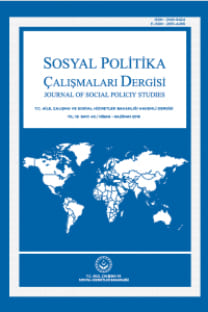Travma Bilgili Bakım ve Sosyal Hizmet
Travma, bireylerin yaşamlarını ve fiziksel bütünlüklerini tehdit eden çeşitli olumsuz olaylar sonucunda ortaya çıkmaktadır. Travma bireylerin sağlığı ve kişiler arası ilişkileri üzerinde kısa ve uzun vadede olumsuz etkiler yapabilmektedir. Travmanın insan yaşamı üzerinde olumsuz sonuçlara neden olması, travmatik yaşam öyküsü olan bireylere yönelik uygulama yaklaşımları geliştirilmesi konusunu da gündeme getirmiştir. Bunun için alanyazında travma bilgili bakım konusu gündeme gelmiştir. Travma bilgili bakım, travmanın yaygınlığının ve etkilerinin farkında olunması ve travma öyküsü olan bireylere yönelik uygulamaların ve kurumsal düzenlemelerin buna göre şekillendirilmesi üzerine inşa edilmiştir. Travma bilgili bakım, travma öyküsü olan birey ve topluluklar hakkında çalışmalar yapılan sosyal hizmet bilimi ve uygulaması için yol gösterici olabilecek bir yaklaşımdır.
Bu çalışmada Amerika Birleşik Devletleri’nde bulunan Madde Bağımlılığı ve Ruh Sağlığı Hizmetleri İdaresi (SAMHSA) isimli kurum tarafından travma bilgili bakımla ilgili ortaya konan varsayım, temel ilke ve uygulama alanlarına yer verilmiş ve sosyal hizmet alanına uyarlanmasına çalışılmıştır. Türkiye’deki alanyazında sosyal hizmet ve travma konusuna yeterince yer verilmediği için, çalışma alanyazına katkı sağlayacaktır
Anahtar Kelimeler:
Travma, travma bilgili bakım, sosyal hizmet
Trauma Informed Care and Social Work
TTrauma arises as a result of various negative events that threaten the lives and physical integrity of individuals. Trauma can have negative effects on the health and interpersonal relationships of individuals in the short and long term. The fact that trauma causes negative consequences on human life has also brought up the issue of developing practice approaches for individuals with a traumatic life history. For this reason, the subject of trauma-informed care has come to the fore in the literature. Trauma-informed care is built on being aware of the prevalence and effects of trauma and shaping practices and institutional arrangements for individuals with a history of trauma. Trauma-informed care is an approach that can guide the science and practice of social work that studies individuals and communities with a history of trauma.
In this study, the assumptions, basic principles and application areas of trauma-informed care put forward by the Substance Abuse and Mental Health Services Administration (SAMHSA) in the United States were included and tried to be adapted to the field of social work. Since the subject of social work and trauma is not sufficiently covered in the literature in Turkey, the study will contribute to the literature.
Keywords:
trauma, trauma-informed care, social work,
___
- Ajdukovic, D. (2004). Social Contexts of Trauma and Healing. Medicine, Conflict and Survival, 20(2), 120–135. doi:10.1080/1362369042000234717
- American Psychiatric Association. (2013). Diagnostic and statistical manual of mental disorders (5th ed.). Arlington, VA: Author.
- Benjet, C., Bromet, E., Karam, E. G., Kessler, R. C., McLaughlin, K. A., Ruscio, A. M., … Koenen, K. C. (2016). The epidemiology of traumatic event exposure worldwide: Results from the World Mental Health Survey Consortium. Psychological Medicine, 46(02), 327–343. doi:10.1017/S0033291715001981
- Berliner, L., & Kolko, D. J. (2016). Trauma Informed Care. Child Maltreatment, 21(2), 168–172. doi:10.1177/1077559516643785
- Bremner, J.D. (2006). Traumatic stress: effects on the brain. Dialogues in Clinical Neuroscience, 8 (4), 445– 461.doi: 10.31887/DCNS.2006.8.4/jbremner
- Cusack, K. J., Frueh, B. C., & Brady, K. T. (2004). Trauma History Screening in a Community Mental Health Center. Psychiatric Services, 55(2), 157–162. doi:10.1176/appi.ps.55.2.157
- Felitti, G., Anda, R., Nordenberg, D., et al., (1998). Relationship of child abuse and household dysfunction to many of the leading cause of death in adults: The Adverse Childhood Experiences Study. American Journal of Preventive Medicine, 14, 245-258. DOI: 10.1016/s0749-3797(98)00017-8
- Herman, J. (2011). Travma ve iyileşme şiddetin sonuçları ev içi istismardan siyasi teröre. İstanbul: Literatür Yayıncılık.
- Kessler, R. C., Aguilar-Gaxiola, S., Alonso, J., Benjet, C., Bromet, E. J., Cardoso, G., … Koenen, K. C. (2017). Trauma and PTSD in the WHO World Mental Health Surveys. European Journal of Psychotraumatology, 8(sup5), 1353383. doi:10.1080/20008198.2017.1353383
- Kimberley, D. & Parsons, R. (2017). Trauma-Informed Social Work Treatment and Complex Trauma. Ed. F.J. Turner. Social Work Treatment Interlocking Theoretical Approaches içinde (ss. 553-573). United States of America: Oxford University Press.
- Knight, C. (2015). Trauma-informed social work practice: Practice considerations and challenges. Clinical Social Work Journal, 43(1), 25–37.
- Levenson, J. (2017). Trauma-Informed Social Work Practice. Social Work. doi:10.1093/sw/swx001
- Levine, A.F. (2013). Kaplanı Uyandırmak Travmayı İyileştirmek. İstanbul: Butik Yayıncılık.
- Mersky, J.P., Topitzes, J. & Britz, L. (2019). Promoting EvidenceBased, Trauma-Informed Social Work Practice, Journal of Social Work Education, 55:4, 645-657, DOI:10.1080/10437797.2019.1627261
- Pernicano, P. (2009). Using Stories, Art, and Play in Trauma-Informed Treatment. Case Examples and Applications Across the Lifespan. New York: Routledge Publishing.
- Substance Abuse and Mental Health Services Administration. (2014b). SAMHSA’s Concept of Trauma and Guidance for a Trauma-Informed Approach. HHS Publication No. (SMA) 14-4884. Rockville, MD: Author. Retrieved from https://ncsacw.samhsa.gov/userfiles/files/SAMHSA_Trauma.pdf
- Van Der Kolk, B. (2018). Beden Kayıt Tutar.Travmanın iyileşmesinde beyin zihin ve beden. Ankara: Nobel Yayınevi. Van der Kolk, B. A. (1989). The Compulsion to Repeat the Trauma. Psychiatric Clinics of North America, 12(2), 389–411. doi:10.1016/s0193-953x(18)30439-8
- VandenBos, G. R. (Ed.). (2015). APA dictionary of psychology (2nd ed.). American Psychological Association. https://doi.org/10.1037/14646-000
- ISSN: 2148-9424
- Yayın Aralığı: Yılda 4 Sayı
- Başlangıç: 2012
- Yayıncı: Aile,Çalışma ve Sosyal Hizmetler Bakanlığı
Sayıdaki Diğer Makaleler
SOSYAL HİZMETLERİN SUNUMUNDA YENİ BİR MODEL OLAN AİLE SOSYAL DESTEK PROGRAMININ (ASDEP) İNCELENMESİ
ÇOCUKLARDA SOSYAL ÖĞRENME SÜRECİNİN SOSYAL HİZMET PERSPEKTİFİNDEN İNCELENMESİ
Gülçin AYITGU METİN, Oguzhan ZENGİN, Beyza ERKOÇ
Travma Bilgili Bakım ve Sosyal Hizmet
KRİZLER ÇAĞINDA YOKSULLUK: SOSYAL TRANSFERLERİN ÖNEMİ ve ETKİNLİĞİ
COVID-19 PANDEMİSİNDE ÖZEL GEREKSİNİMLİ ÇOCUKLAR VE ANNELERİNİN DENEYİMLERİ: NİTEL BİR ARAŞTIRMA
Yunus Emre KUNDAKCI, İsa GÜL, Aysun YEŞİLTAŞ, Rabia KUNDAKCI
TÜRKİYE’NİN NÜFUS POLİTİKALARINDAKİ DEĞİŞİMİN KALKINMA PLANLARI ÜZERİNDEN DEĞERLENDİRİLMESİ
